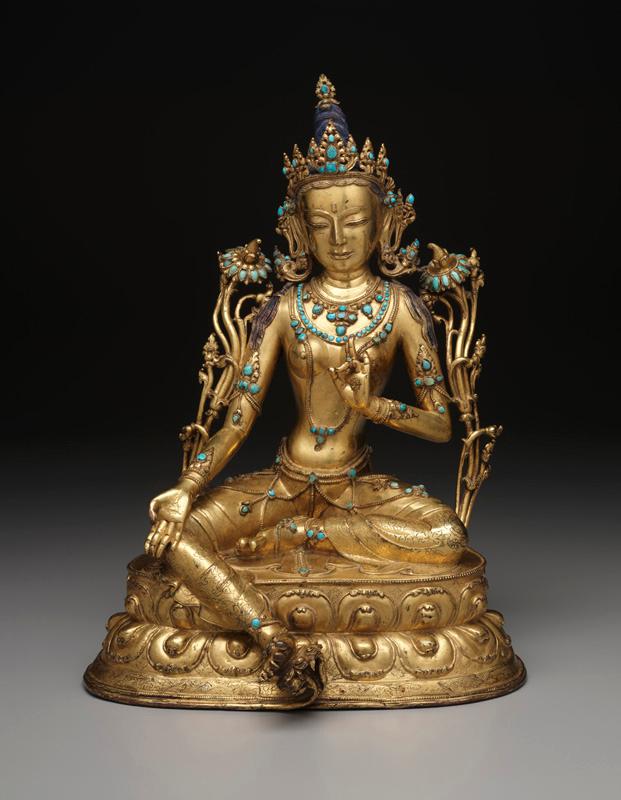As the new Manager of Docent and Teacher Programs, my first few weeks at the DMA have flown by in a busy, joyous blur. Everyday seems filled to the brim as I acclimate to my new role and learn as much as I can from my new colleagues and our fabulous docent team. In the midst of this whirlwind of activity, I find myself coming back to the Asian Art collections again and again to visit a familiar face— Green Tara, a beloved female Bodhisattva central to Tibetan Buddhism.

Green Tara, Tibet, 18th century, Gilt copper alloy and turquoise, Dallas Museum of Art, the Cecil and Ida Green Acquisition Fund
In the summer of 2008, I had the opportunity to study Buddhist philosophy and Tibetan history and culture at the College for Higher Tibetan Studies in Himachal Pradesh, India through Miami University’s Anthropology Department. Each morning before breakfast, my fellow students and I would wipe the sleep from our eyes and make our way to temple to practice meditation with our teacher, Geshe Kalsang Damdul la, a monk and scholar with an advanced degree in Tibetan Buddhism. Geshe la taught us the value of cultivating resilience and mindfulness through meditation. I can still picture him chuckling and asking us, “What good is being a genius if you don’t know how to live a quality life? I appeal to you, practice!”
- The College for Higher Tibetan Studies in Himachal Pradesh, India.
- A sweet welcome message from our hosts, the monks and nuns who study at the College for Higher Tibetan Studies.
- Incense perfuming the air during morning prayers.
- A lot of hungry monks lined up for their afternoon daal.
As we embarked on our practice, Geshe la instructed us that one possibility was to direct our meditation towards a deity. He suggested Green Tara, a much-loved female Bodhisattva distinguished by her emerald green skin, maternal compassion, and constant readiness to protect her devotees from physical and mental misfortune.
On our last day, one of my monk friends pressed a printed Green Tara card into my hand and told me, via a translator, that I should keep her with me always for protection. She has been with me ever since, tucked safely in my wallet.
- Prayer flags decorating sacred sites in the Himalayan foothills.
- Spinning prayer wheels at the Dalai Lama’s temple complex in Dharamsala, Himachal Pradesh, India.
The DMA’s exquisite 18th century Green Tara sits on her lotus throne with her right leg extended, ever-ready to leap to the aide of the suffering. Her hand gestures, or mudras, symbolize protection and boon granting. Shining gilt copper alloy flecked with cool turquoise stand in for the Bodhisattva’s characteristic emerald skin. What I love most about Green Tara is the delicate suggestion of tension in her lithe figure—she’s at once in a state of perfect calm and ready to spring into action.
Visiting Green Tara brings me back to the stillness of those early mornings spent in meditation, and reminds me of the sense of ease and wellbeing we experienced chanting the Bodhisattvas’s mantra together with Geshe la. Om Tare Tuttare Ture Svaha.
Lindsay O’Connor
Manager of Docent and Teacher Programs






1 Response to “Green Tara at the DMA”